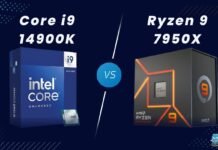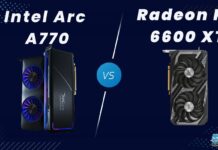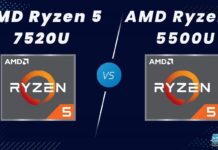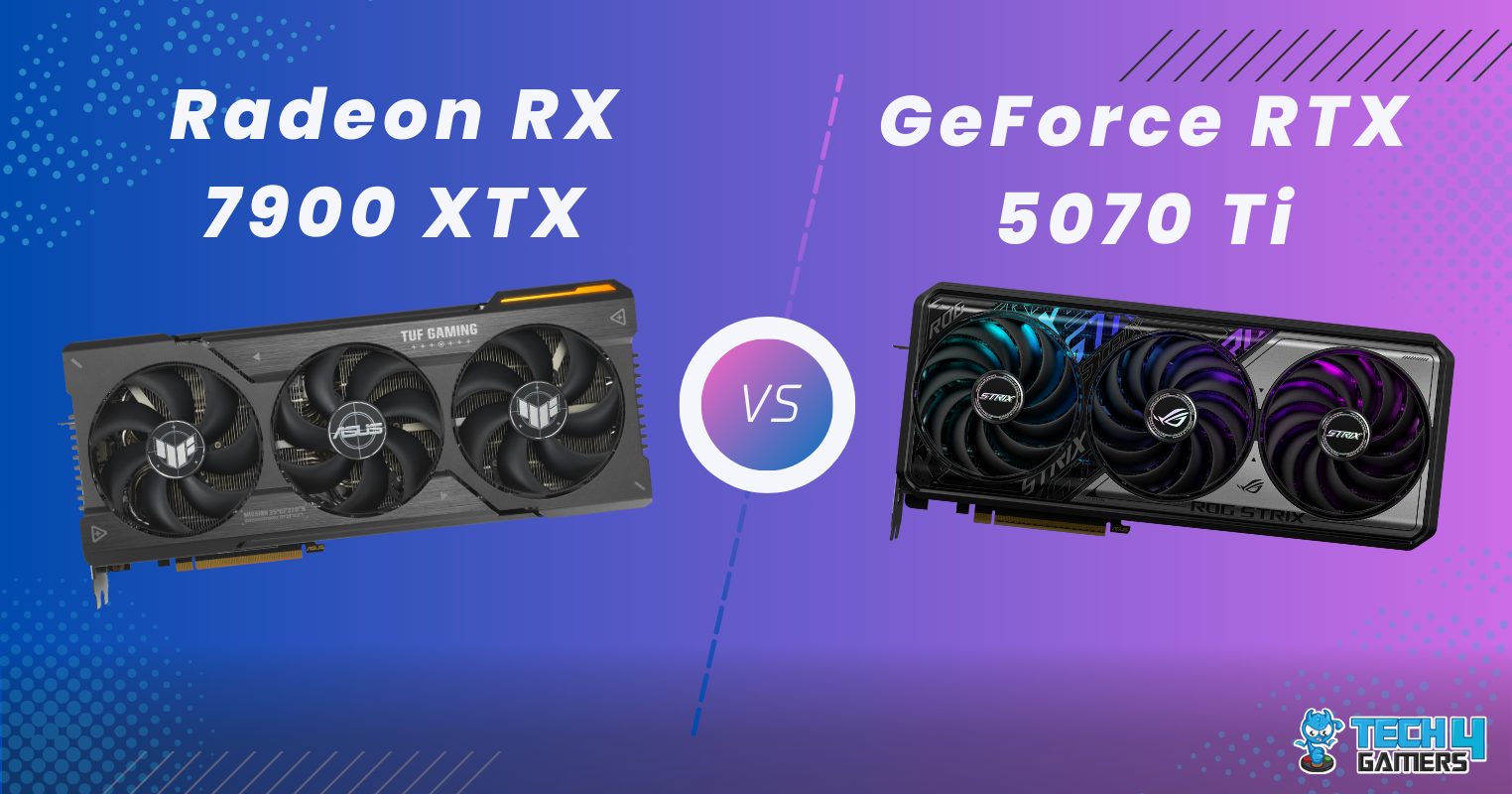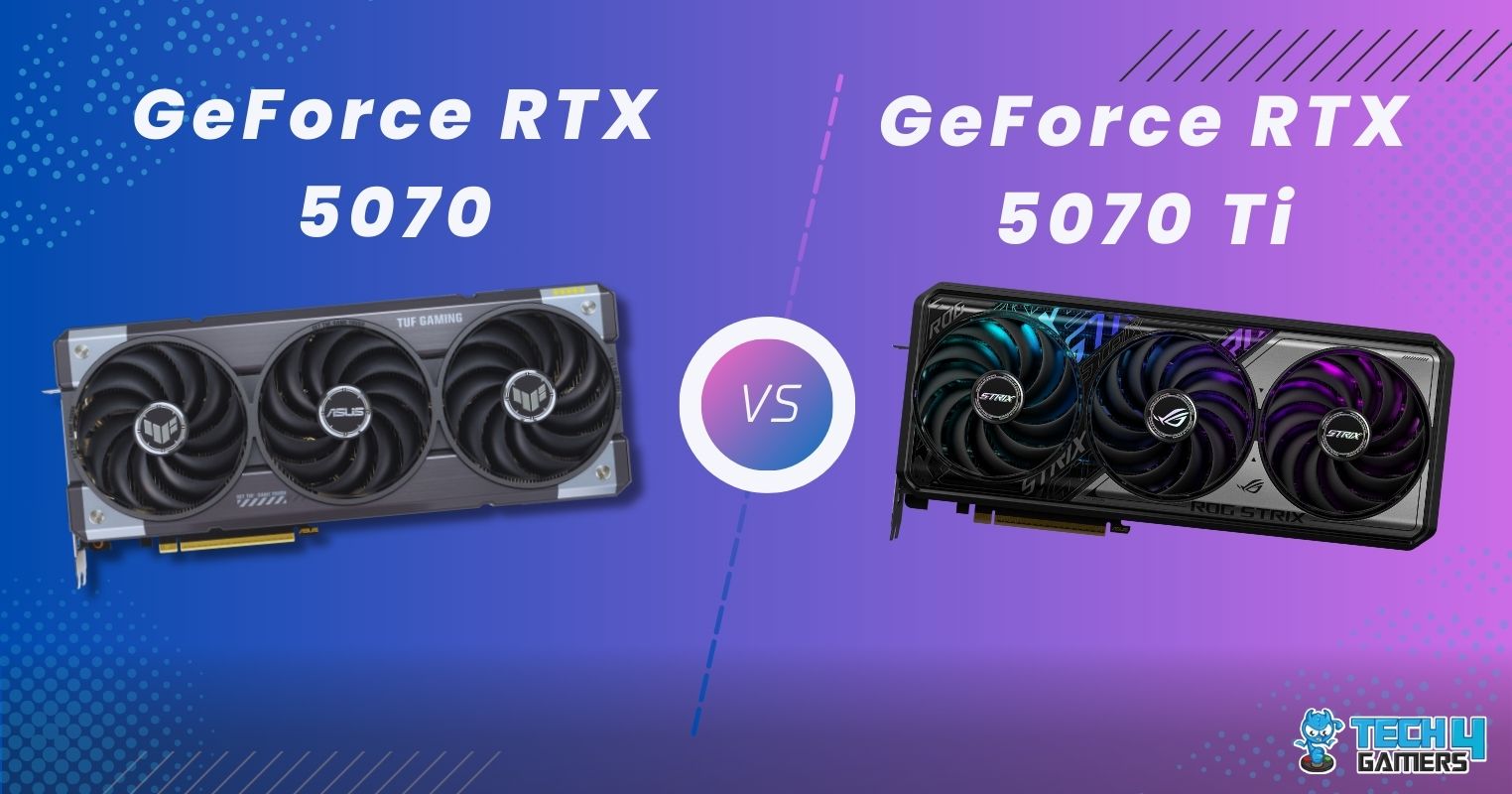With the latest Intel release in our possession, the moment has arrived to pit the Core i5-14600K against AMD’s renowned budget-friendly performer, the Ryzen 7 7800X3D. In the Core i5-14600K vs Ryzen 7 7800X3D, we’ll explore the specifications of the two CPUs in detail.
Key Takeaways
- The Core i5-14600K leverages Intel’s cutting-edge Raptor Lake Resume architecture. In contrast, the Ryzen 7 7800X3D showcases AMD’s state-of-the-art Zen 4 design.
- Having personally tested, the Ryzen 7 7800X3D exhibits a gaming performance advantage of approximately 13% at 1080p compared to the Core i5-14600K.
- According to my results, the Ryzen 7 7800X3D is about 58.9% more energy-efficient and 13.5% more thermally efficient than the Core i5-14600K.
- About their MSRPs, Intel released the Core i5-14600K for $329, while AMD introduced the Ryzen 7 7800X3D for $449.
Comparison Table
| Feature | Intel Core i5-14600K | AMD Ryzen 7 7800X3D |
|---|---|---|
| Codename | Raptor Lake | Raphael AM5 |
| No. of Cores | P-Cores: 6 E-Cores: 8 Total Cores: 14 | 8 |
| No. of Threads | 20 | 16 |
| Base Frequency | 3.5 GHz | 4.2 GHz |
| Boost Frequency | Up to 5.3 GHz | Up to 5.0 GHz |
| Integrated Graphics | Intel UHD Graphics 770 | AMD Radeon Graphics |
| Graphics Max Frequency | Up to 1.55 GHz | Up to 2.20 GHz |
| Memory Type & Frequency | DDR5: Up to 5600 MT/s DDR4: Up to 3200 MT/s | DDR5: Up to 5200 MT/s |
| Cache | 24 MB Intel Smart Cache | 96MB AMD 3D V-Cache |
| Max. Operating Temperature | 100°C | 89°C |
| TDP | 125W - 181W | 120W |
| Launch Date | Oct 17th, 2023 | April 6th 2023 |
| MSRP | $329 | $449 |
| Best Motherboards | Best Motherboards For i5-14600K | Best Motherboards For Ryzen 7 7800X3D |
| Best CPU Coolers | Best CPU Coolers For Core i5-14600K | Best Coolers For Ryzen 7 7800X3D |
| Best RAM | Best RAM For Core i5-14600K | BEST RAM For Ryzen 7 7800X3D |
| Best GPU | Best GPU For Core i5-14600K | BEST GPUs For Ryzen 7 7800X3D |
Architectural Difference
- Process Node: The Core i7-14700K is simulated using Intel’s 10nm process. Contrarily, the Ryzen 7 7800X3D is fabricated on TSMC’s cutting-edge 5nm semiconductor node.
- CPU Socket: The AM5 socket of the Ryzen 7 7800X3D performs better than the FCLGA1700 of the Core i5-14600K. Its excellent 1718-pin design ensures greater cooling capabilities and improved data processing speed.
- Clock Speed: Comparing the clock speeds, the Ryzen 7 7800X3D exhibits a remarkable 20.0% higher base clock. While the Core i5-14600K tops with a 6.0% higher boost clock. Moreover, the Ryzen 7 7800X3D has a great potential for overclocking.
- CPU Memory: The Core i5-14600K offers 192GB DDR5 memory with DDR4 support, while the Ryzen 7 7800X3D provides 128GB DDR5 memory and does not support DDR4.
- Integrated Graphics: Concerning the iGPU, both processors have dual-core iGPUs, but the Ryzen 7 7800X3D’s AMD Radeon Graphics executes faster with a 33.3% higher clock speed.
Gaming Benchmarks
Following the detailed specs and architecture analysis, we will assess both processors using a series of gaming benchmarks at 1080p resolution to judge their overall performance. Let’s get right to the gaming battle of the Core i5-14600K vs Ryzen 7 7800X3D.
Test Bench
I employed the following specifications for the gaming test bench.
- OS – Windows 11
- CPU Cooler – Cooler Master MasterLiquid Lite ML240L RGB
- Graphics Card – GIGABYTE RTX 4090 Gaming OC 24G
- SSD – XPG Gammix S70 Blade 2TB NVMe
- Power Supply – ENERMAX REVOLUTION D.F. X 1050W
- GPU –GIGABYTE RTX 4090 Gaming OC 24G
A Plague Tale: Requiem

- Starting with the evaluation of A Plague Tale: Requiem gameplay, the Ryzen 7 7800X3D delivered an average frame rate of 176 FPS and performed 20.5% better than the Core i5-14600K’s 146 average FPS.
- Comparing the low 1% performance metric, the Core i5-14600K (128 FPS) fell slightly short of the Ryzen 7 7800X3D’s 137 FPS.
Call of Duty: Warzone 2.0

- Moving on to the next title I played, Call of Duty: Warzone 2.0, the Ryzen 7 7800X3D achieved an impressive average frame rate of 243 FPS, surpassing the Core i5-14600K by a great 22.1% margin.
- In the worst 1% performance benchmark, the Core i5-14600K achieved 134 FPS, shy of the Ryzen 7 7800X3D’s 177 FPS.
Counter-Strike 2

- During Counter-Strike 2, the Ryzen 7 7800X3D delivered an outstanding average frame rate of 588 FPS, defeating the Core i5-14600K’s 575 FPS by 2.3%.
- From my firsthand encounter, the Core i5-14600K came remarkably close to the Ryzen 7 7800X3D in the low 1% performance delivery, with a respectable 177 FPS, just 9 FPS short of Ryzen 7 7800X3D’s 186 FPS.
Cyberpunk 2077

- While using Ryzen 7 7800X3D in Cyberpunk 2077, I got 19.2% or 30 FPS greater performance than the Core i5-14600K’s 156 FPS on average.
- Looking at the low 1% frame rates, the Core i5-14600K only managed 131 FPS, while the Ryzen 7 7800X3D provided an incredible 161 FPS.
Fortnite

- When running Fortnite with the Ryzen 7 7800X3D, I experienced a remarkable 23.5% performance boost compared to the Core i5-14600K’s 473 FPS, achieving a superb average of 584 FPS.
- During the worst 1% performance time, the Core i5-14600K delivered a mere 168 FPS, whereas the Ryzen 7 7800X3D achieved an astounding 229 FPS.
Hogwarts Legacy

- During Hogwarts Legacy, the Ryzen 7 7800X3D delivered a remarkable 15.9% performance gain compared to the Core i5-14600K’s 69 FPS and provided an outstanding average of 80 FPS.
- Per my observation of low 1% performance, the Core i5-14600K only managed 42 FPS in Hogwarts Legacy, while the Ryzen 7 7800X3D soared to an impressive 55 FPS.
Spider-Man: Miles Morales

- While playing Spider-Man: Miles Morales, I noted that the Ryzen 7 7800X3D exhibited a striking 20.4% performance boost over the Core i5-14600K, achieving 165 FPS on average, as opposed to the latter’s 137 FPS.
- Furthermore, at the low 1% performance, the Core i5-14600K struggled to maintain a rate of 122 FPS, whereas the Ryzen 7 7800X3D excelled with an impressive 141 FPS.
Starfield

- During my Starfield gaming session, I observed the Ryzen 7 7800X3D topped the Core i5-14600K by 5.5%, averaging 96 FPS vs 91 FPS for the latter.
- Additionally, the Core i5-14600K struggled to sustain a frame rate of 79 FPS at low 1%, while the Ryzen 7 7800X3D excelled with an impressive 85 FPS.
Valorant

- Employing the Ryzen 7 7800X3D in Valorant, I got an average frame rate of 573 FPS, 11.9% faster than the Core i5-14600K’s 512 FPS.
- Taking into account the 1% low frame rates, the Core i5-14600K achieved 178 FPS, still falling short of the Ryzen 7 7800X3D’s impressive 230 FPS performance.
The Last of Us Part I

- Concluding my gaming benchmark session with The Last of Us Part I, I experienced a fantastic 4.6% performance gain, as the Ryzen 7 7800X3D maintained an average of 181 FPS, beating the Core i5-14600K’s 173 FPS.
- Considering the low 1% frame rates, the Core i5-14600K reached 150 FPS, again trailing behind the Ryzen 7 7800X3D’s winsome 170 FPS.
Productivity Benchmarks
We used the same setup as above to run the gaming benchmarks. Knowing this will help you make a more informed decision.
Cinebench R23
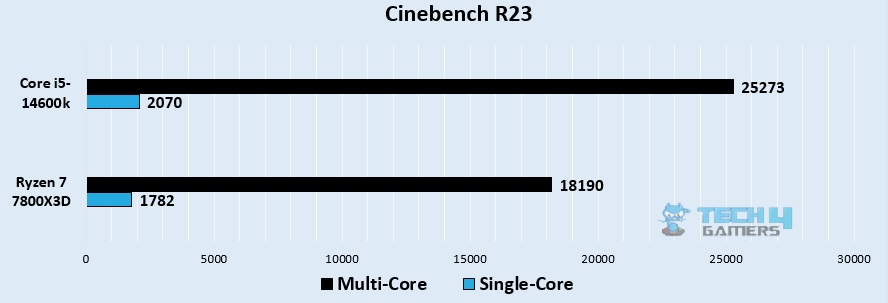
- For Core i5-14600k, we saw a score of 2070. The Ryzen 7 7800X3D was behind by 288 points, scoring 1782 in single-thread tests.
- The multi-core tests, again, showed a better performance for Core i5-14600k with a score of 25273. Meanwhile, the Ryzen 7 7800X3D stayed behind by 32.5% with a score of 18190.
Passmark
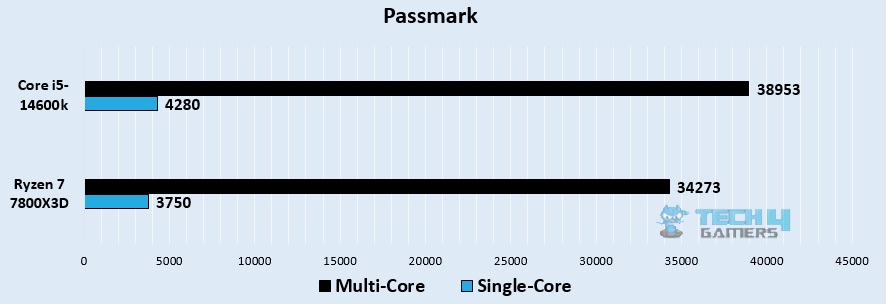
- The Core i5-14600k scored 4280 in the single-threaded Passmark benchmark, while the Ryzen 7 7800X3D scored 3750 on the same benchmark. The prior outperformed by a significant margin of 13.2%.
- The multi-core test showed a performance of 38953 for Core i5-14600k. However, the Ryzen 7 7800X3D performed 12.8% less than its competitor, with a benchmark score 34273.
GeekBench v6
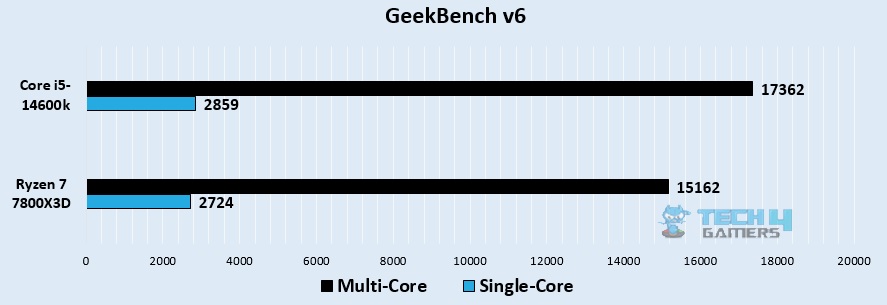
- In Core i5-14600k, we saw an interesting score of 2859 for single-core. Meanwhile, the Ryzen 9 9950X came out to be 2724. The Ryzen 9 9950X outperformed its rival by a small margin of 1.1%.
- The multi-core benchmark using GeekBench v6 for Core i5-14600k was 17362. Similarly, the Ryzen 9 9950X scored 15162 on the same test. This time, Core Ultra 9285K performed better, leading the score by 6%.
Overall Performance
| Processor | Average FPS | 1% Lows | Productivity (Rating) |
|---|---|---|---|
| Core i9 13900KS | 📈200.1 | 📉153.1 | ✏️9/10 |
| Ryzen 7 7800X3D | 📈213.4 | 📉171.1 | ✏️4.9/10 |
| Winner: Ryzen 7 7800X3D |
Average Frame Rate
After analyzing the benchmark data, I found that the Ryzen 7 7800X3D secured victory in the gaming performance battle, boasting an average of 286.7 FPS, edging out the Core i5-14600K, which managed a 253.6 FPS average.
The Ryzen 7 7800X3D consistently dominated in every game I played, leaving the Core i5-14600K unable to secure a victory. Hence, the Ryzen 7 7800X3D delivers roughly 13.1% superior gaming performance compared to the Core i5-14600K at 1080p.
Low 1% Frame Rate
Examining the low 1% performance figures, the Ryzen 7 7800X3D averaged 166.5 FPS, higher than the Core i5-14600K’s 131.5 FPS. Accordingly, at low 1% performance conditions, the Ryzen 7 7800X3D defeats the Core i5-14600K by 26.6%.
Productivity
Core i5 came out to be the real winner in the three productivity tests we conducted. Although the Ryzen scores weren’t bad compared to its rival, it did not meet the expectations.
Here is a glimpse into the tests and gameplay that we conducted to benchmark these processors.
Power Consumption
Reminder: The Core i5-14600K features a maximum TDP of 181 watts, whereas the Ryzen 7 7800X3D has a default TDP of 120 watts, showing a 51.7% difference in the rated power.
| Game | Intel Core i5-14600K (watts) | AMD Ryzen 7 7800X3D (watts) |
|---|---|---|
| A Plague Tale: Requiem | 107.7 | 75.5 |
| Call of Duty: Warzone 2.0 | 108.2 | 74.1 |
| Counter-Strike 2 | 92.1 | 59.1 |
| Cyberpunk 2077 | 88.2 | 55 |
| Fortnite | 87.3 | 54 |
| Hogwarts Legacy | 85.1 | 51.7 |
| Spider-Man: Miles Morales | 102.4 | 70 |
| Starfield | 85.1 | 60.6 |
| Valorant | 77.7 | 43.9 |
| The Last of Us Part I | 102.1 | 45.7 |
| Average Power Consumption | 93.6 | 58.9 |
Throughout my gaming sessions, the Core i5-14600K operated at an average power of 93.6 watts. Meanwhile, the Ryzen 7 7800X3D drew 58.9 watts on average.
Let’s compute the ratio of performance to power consumption. The Ryzen 7 7800X3D produced 4.87 frames per watt, while the Core i5-14600K generated 2.71 frames per watt.
So, the Ryzen 7 7800X3D surpasses the Core i5-14600K by 58.9% in power efficiency, leading to notable reductions in electricity costs.
Gaming Temperatures
| Game | Intel Core i5-14600K (°C) | AMD Ryzen 7 7800X3D (°C) |
|---|---|---|
| A Plague Tale: Requiem | 55 | 48 |
| Call of Duty: Warzone 2.0 | 56 | 50 |
| Counter-Strike 2 | 59 | 51 |
| Cyberpunk 2077 | 58 | 51 |
| Fortnite | 55 | 49 |
| Hogwarts Legacy | 64 | 56 |
| Spider-Man: Miles Morales | 63 | 55 |
| Starfield | 57 | 51 |
| Valorant | 59 | 51 |
| The Last of Us Part I | 54 | 49 |
| Average Gaming Temperature | 58.0 | 51.1 |
In my testing session, the Core i5-14600K ran at an average gaming temperature of 58.0°C. Nonetheless, the Ryzen 7 7800X3D stayed cooler at an average of 51.1°C.
With these statistics, it’s evident that the Ryzen 7 7800X3D exhibits a 13.5% superior thermal efficiency compared to the Core i5-14600K.
Furthermore, the CPUs’ temperatures remain well below their maximum limits, making thermal management a minimal concern in this scenario. To deal with CPU overheating, read How To Lower CPU Temperature?
Price And Availability
Let’s now address the costs and availability of each CPU. AMD debuted the Ryzen 7 7800X3D at a price point of $449, whereas Intel recently unveiled the Core i5-14600K, which has an initial price tag of $329.
Regarding their current pricing, the Ryzen 7 7800X3D currently commands a price of $395. It is also more reasonably priced at $329 if you need the Core i5-14600K.
Concerning their availability, both processors are easily accessible via well-known online retailers like Amazon and Newegg, as well as official Intel and AMD stores.
Which One Would I Recommend?
Now, let me wrap up the comparison of the Core i5-14600K vs Ryzen 7 7800X3D with my recommendation.
For top-tier gaming performance, content creation prowess, and exceptional value, I wholeheartedly endorse the AMD Ryzen 7 7800X3D. The Ryzen 7 7800X3D is a superior choice in terms of overall value.
Although the Ryzen 7 7800X3D costs a bit more than the Core i5-14600K, its outstanding performance and improved energy efficiency not only make up for the price difference but also result in potential cost savings.
The Core i5-14600K, with its elevated power consumption, has the potential to drive up electricity bills, while the Ryzen 7 7800X3D excels in keeping these costs under control. However, the productivity scores for Core i5-14600k were far superior to the Ryzen 7 7800X3D.
So for those seeking the latest technology at a more budget-friendly price point, I’d suggest considering the Core i5-14600K.
n this comparison, I saw the Ryzen 7 7800X3D implementing a huge lead of 13.1% over its competition, the Intel Core i5-14600K, which allows me to easily recommend it to our users as it not only provides better FPS results but better thermal and power efficiency.
– Abde Manaf
Pros And Cons
| Core i5-14600K | Core i5-14600K | AMD R7 7800X3D | AMD R7 7800X3D |
|---|---|---|---|
| Pros | Cons | Pros | Cons |
| Overall good performance for $319 - $329 | High power consumption | Excellent gaming performance | Low performance in productivity apps |
| Support both DDR5 and DDR4 memory | No Turbo Boost 3.0 | Incredibly power efficiency | Expensive AM5 ecosystem |
The Ryzen 7 7800X3D delivers superior gaming performance. At 1080p, the Ryzen 7 7800X3D performs about 13% better than the Core i5-14600K. You can use DDR4 memory with the Core i5-14600K. However, the Ryzen 7 7800X3D does not support the DDR4. AMD Ryzen 7 7800X3D is a better pick for video editing due to its enhanced efficiency and less power consumption. Due to a greater number of threads and cores, the Intel Core i5-14600k offers faster performance than Ryzen, which makes it an excellent pick for multi-tasking. The Ryzen 7 7800X3D consumes less energy during gaming and is about 58.9% more power-efficient than the Core i5-14600K.Frequently Asked Questions
More From Ryzen 7 7800X3D:
Thank you! Please share your positive feedback. 🔋
How could we improve this post? Please Help us. 😔
[Comparisons Expert]
Abdemanaf is a skilled creative writer who has been honing his craft since 2011. While initially working in different fields, he found a passion for technology and has been exploring the tech world since early 2015. Over the years, he has developed an in-depth knowledge of the latest tech trends and product offerings by various companies.
Abdemanaf’s writing reflects his analytical mindset and ability to think critically. He has a knack for breaking down complex technical information into easily digestible pieces, making his articles engaging and accessible to readers from all backgrounds. In February 2022, he joined Tech4Gamers as a blog and product comparison writer, where he has been able to hone his skills further.
As a writer, Abdemanaf is dedicated to staying up-to-date with the latest technological advancements and trends, enabling him to provide readers with the most relevant and accurate information. He is always eager to learn more and is constantly seeking new challenges to improve his skills.
Get In Touch: manaf@tech4gamers.com


 Threads
Threads